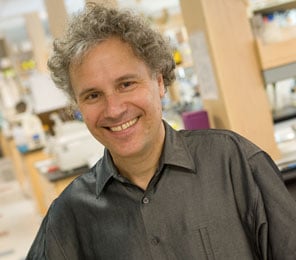 |
|
| Victor R. Ambros, PhD | |
Longtime collaborators Victor R. Ambros, PhD, the Silverman Chair in Natural Sciences and professor of molecular medicine, and Gary B. Ruvkun, PhD, of Massachusetts General Hospital and Harvard Medical School, were awarded the 2012 Dr. Paul Janssen Award for Biomedical Research today by Johnson & Johnson for their co-discovery of microRNA (also known as miRNA), tiny molecules that are now understood to play a powerful role in gene expression and regulation. The award was announced during an event at the Biotechnology Industry Organization International Convention in Boston.
The award was created by Johnson & Johnson to honor the legacy of one of the most passionate, creative and productive scientists of the 20th century, Dr. Paul Janssen (1926-2003). The legacy of Dr. Paul—as he was known in the scientific community—continues to inspire the company’s commitment to developing innovative solutions for unmet medical needs. Dr. Paul’s work led to breakthroughs in several fields, including pain management, psychiatry, infectious disease and gastroenterology. Four of the drugs discovered by Dr. Paul and his team remain on the World Health Organization’s list of essential medicines.
This is the second time in six years that a UMass Medical School scientist has been recognized by the Janssen Award selection committee. Craig C. Mello, PhD, Howard Hughes Medical Institute Investigator, Blais University Chair in Molecular Medicine and distinguished professor of molecular medicine and cell biology, won the inaugural Janssen Award in 2006.
Dr. Ambros joined UMMS in 2007 and has received numerous honors for his scientific achievements, including the Benjamin Franklin Medal in Life Science, the Canada Gairdner Award and the Lasker Award for Medical Research in 2008. The following year he received the Louisa Gross Horwitz Prize and the Meira and Shaul G. Massry Prize. He is also a recipient of the Lewis S. Rosenstiel Award for Distinguished Work in Basic Medical Research.
“Victor is one of the great pioneers of microRNAi and an integral member of an exceptional community of RNA researchers here at UMass Medical School. Together, these faculty are advancing the world’s understanding of fundamental biological mechanisms and furthering the field of biomedical sciences,” said Chancellor Michael F. Collins, MD. “We are delighted to see Victor recognized with this remarkable award from his colleagues and fellow scientists.”
“Victor’s pioneering discovery of miRNA occurred at a time when the field was not mentally prepared to understand its full significance,” said Terence R. Flotte, MD, the Celia and Isaac Haidak Professor of Medicine, executive deputy chancellor, provost, and dean of the School of Medicine. “We now know that miRNAs have key functions in a variety of human diseases, ranging from hyperlipidemia (high blood cholesterol) to cancer.”
Since the discovery of microRNAs in 1993, these regulatory molecules have been implicated in a wide range of both normal and pathological activities including embryonic development, blood-cell specialization, muscle function, heart disease and viral infections. Their discovery has opened new fields of research and has implications for the development of new therapeutic treatments and diagnostic tools.
Working independently, Ambros and Dr. Ruvkun led the groups that identified the first miRNA and the first miRNA target. Ambros’ lab yielded the discovery of the first miRNA and Dr. Ruvkun’s lab identified how that miRNA regulates its target messenger. Working together, they demonstrated that the miRNA inactivates its target through direct, base-pairing interactions. MicroRNAs have been linked to cancer and identified as regulators of numerous other developmental events in both plants and animals. As a result of this discovery, researchers are now exploring miRNAs for use in diagnosis and prognosis as well as potential therapies.
“We are honored to join the distinguished list of past awardees of the Dr. Paul Janssen Award for Biomedical Research,” said Ambros. “It is a testament to the wisdom of private and government patrons that fundamental research such as ours was supported over the years, and that it is paying off in new understanding of disease processes . . . and possibly in cures for patients.”
“Our research grew out of long-standing traditions in the field aiming to unearth molecular explanations for how biological systems work, with the hope that if an understanding was achieved, practical applications would likely emerge,” said Ruvkun. “We have seen the small RNA field grow from our first papers to thousands of papers, many focused on particular diseases and treatments of diseases. The research has come full circle—from fundamental biology to medicine—just as we had hoped.”
“The groundbreaking research of Dr. Ambros and Dr. Ruvkun has revolutionized the understanding of gene regulation, with significant implications for future developments in the medical field,” said Paul Stoffels, MD, worldwide chairman of pharmaceuticals at Johnson & Johnson. “Perhaps equally important is the spirit of collaboration exemplified by these researchers—exactly what Dr. Paul advocated in his own labs. Their success demonstrates that we can achieve so much more when we work together, rather than in silos.”
The winners of the Dr. Paul Janssen Award for Biomedical Research are chosen by an independent committee of renowned scientists, including Nobel Laureates and Lasker Prize winners. The award, which includes a $100,000 prize, will be presented to Ambros and Ruvkun in a ceremony followed by a scientific symposium at the New York Academy of Sciences in New York on Friday, Sept. 7.